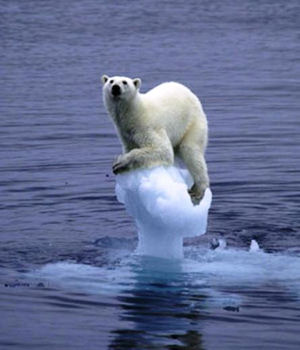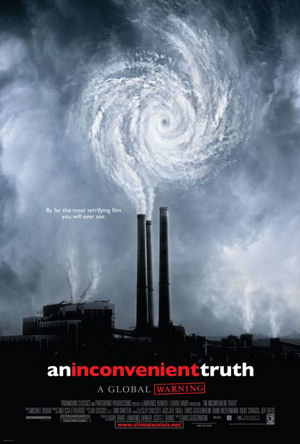Rethinking AGW, Part 1: Outline of Intent
 | | Either the world is on fire or it's been a redhead this whole time |
Any good skeptic and critical thinker should be willing to consider the possibility that his or her conclusions on any given subject are wrong. One subject with which I have grappled for well over a decade is the notion of AGW--anthropogenic (manmade) global warming--the hypothesis that the Earth's climate is undergoing a radical change and it is being caused by mankind. A recent study--conducted and sponsored by notable AGW skeptics and expressly designed to tackle popular criticisms of the so-called scientific consensus--seems to confirm that the Earth is, in fact, getting hotter. This study has yet to be peer-reviewed or replicated and doesn't address one of the core precepts of AGW, namely that mankind is the source of the climatological flux. However, it should give skeptics pause and is a valid catalyst for something I've been meaning to do for some time: fearlessly rethink my stance on anthropogenic global warming.
The central problem with a lay person attempting to sort out the facts on this matter is that AGW is an intensely politicized issue and nearly all the information readily available to the public is dripping with ideological bias and/or ulterior motive. On one side are the activists and alarmists, the people who loudly insist that there is no valid scientific debate, that AGW is real, and that we as a society have to do as much as we can to curb our carbon emissions in order to prevent a coming climatological disaster of Biblical proportions. On the other side are the rabid denialists, the people who are all too eager to embrace the theory that scientists and politicians have conspired to perpetuate a great hoax on the populace in order to enact draconian, anti-capitalist government policies that are designed to destroy our way of life.
As I roll up my sleeves and prepare to get down and dirty, I think it is important to lay out my current understanding of the issue, my own political bias, the beliefs I have formed, and what exactly I hope to achieve over the course of this enterprise. I plan on writing an installment for this series of articles every three to four weeks, but I'm not going to make a specific outline of where it will go. I want the evidence to guide me, but I will briefly list some of the most important facets of the issue, things to which I hope to devote at least one full article.
 | | Oh, that poor polar bear! If only it could swim... |
Today, though, is all about my current state of thought. I am not going to consult any outside sources for this installment, because I want it to come straight from my brain. I want this to be a pure record of how I think about AGW before undertaking my new intellectual exercise. I typically don't ask my readers to point out logical fallacies in my writings (in fact, I tend to discourage such things as I am not too good at dealing with trolls), but on this one, I want people to take a critical look at what I'm writing and pick out where my thought processes or data might be going awry. You see, I am going to do my best to prove myself wrong, which is what a true scientist would do (not that I claim to be, in any way, a trained scientist), and for that, some objective opinions would be helpful. What would not be helpful is outright hostility or political posturing, which I will do my best to completely ignore. I want this to be an intellectually honest, unemotional experience, something I realize is virtually impossible given the controversial nature of the topic.
So let me get straight to it: I don't currently believe that AGW is all that real, but if it is, I don't believe it is as big a deal as the alarmists make it out to be. At the same time, however, I do believe that the climate is changing, because the climate is always changing. The questions are whether or not the current climate trends are extreme or unusually rapid, whether the kind of climate we see today is wholly unprecedented in known climatological history, whether carbon dioxide is a major contributor to climate change, and of course, whether or not human activity is changing the equation radically enough to affect global climate today or in the future. These are questions I am willing to concede I don't have the answers to and are going to be the primary focus of my initial research.
Where my beliefs put me on the side of the AGW skeptics, though, is in the nature of the current approach to the subject. I firmly believe that there are intense pressures on the scientific community--financial, political, and professional--that bias the results in favor of AGW alarmism. It is easier to get a study published if it includes a section on climate change, and studies that are sensationalistic or alarming are more likely to be published than negative studies, leading to a "file drawer effect." It's difficult to get a paper published on the mating habits of the yellow Australian beaver rabbit (not a real animal), for example, but if you punctuate your findings with a section about the catastrophic effects climate change could have on the mating habits of the yellow Australian beaver rabbit, you could easily get published in The Journal of Australian Biological Sciences. Subsequently, you would probably get a modicum of media attention, which will, of course, be willing to exploit the plight of future yellow Australian beaver rabbits to reinforce the common AGW narrative in popular culture.
 | | These aren't bad things, but can they save the planet? |
There seems to be a movement within the world's mainstream media to focus attention on the potential severity of AGW while downplaying anything that is skeptical or cautious of it. I have heard anectdotes--though I cannot speak to their veracity today--involving media seminars where reporters and editors are taught how to discuss AGW so that everyone has the overall story straight. Though well-intentioned, this media bias seems built on a Pascal's Wager approach to AGW; if it is real and we can stop it, why would we encourage dissenting opinions? However, this narrative ignores the very real economic impact draconian political measures would have on the world stage, especially now. This is probably why AGW isn't such a big story these days, because the current world financial crisis is forcing our priorities in a different direction.
Still, I can easily see how such thinking can be a potential stumbling block, a way of protecting my beliefs from disconfirmation. It's like any good conspiracy theory in that any evidence you bring to bear against it could be seen as part of the conspiracy. This is why the recent study I mentioned at the start is so compelling, because it comes from people who, if anything, are biased against AGW. If I am willing to believe that even they have been duped by grant promises, the file drawer effect, and media manipulation, then I have no defense against the "denialist" label. Still, that doesn't seem to be enough to make me a true believer either, because I see similar thinking on the other side of the debate. True believers in AGW are fountainheads of special pleading and unfalsifiable claims. For example, when a well-known AGW prediction (such as a rise in hurricane activity in 2006) doesn't hold true, you almost never get a good explanation as to why.
I've heard lots of interesting things from the skeptical side of the equation, though, some more believable than others. I've heard that manmade greenhouse gas emissions are less than a tenth of a percent of all the daily greenhouse gas emissions on Earth, that a good volcano eruption can throw up more greenhouse gases than the combined totality of carbon dioxide released by human industry throughout all of history. I've heard that, if you look at the climate record, carbon dioxide levels seem to correlate after temperature changes, not before, putting the entire cause and effect relationship in reverse. I've heard that somehow certain climate scientists have figured out that global climate tracks more intimately with global cloud coverage than with carbon saturation levels. I've heard that the sun has more to do with climate than all other factors put together. There's lots more, but you get the idea. Perhaps I've latched on to some of these notions because I want them to be true, so what I need to do is carefully examine the facts and evidence with a modest understanding that I cannot possibly know better than people who have trained and studied their whole lives to understand this stuff.
 | | Now on my Netflix cue |
It would take years for me to sift through all of this by myself, and there is no guarantee I'd be able to do it without confirmation bias rearing its ugly head. The fact remains that, politically speaking, I most closely resemble a Libertarian, and while I do believe Libertarianism provides a possible solution to AGW, the AGW narrative is perhaps the greatest threat to a Libertarian worldview than any other modern political subject. I freely accuse AGW alarmists of letting their political opinions taint their ability to look at this matter clearly, so I must be willing to admit that I too have fallen into this trap from time to time. From all sides of this issue, people seem to take a lot of things on faith and defend them with an almost religious fervor.
Indeed, in the past, I have embraced ideas that I now realize are wrong. I have written in the past that "scientific consensus" is an oxy moron, because science does not operate by consensus. However, if you really think about it, science does operate by consensus. I think I confused "consensus" with "unanimity," and if you go back and look at the arguments I was making, "unanimity" makes a lot more sense. With only a handful of exceptions, I don't think anyone--even the most wild-eyed alarmist--is trying to say that scientists are completely unanimous about AGW. If there are people out there making this point, they are clearly wrong, because scientists, as a general rule, are never completely unanimous about anything. This is not to say they don't arrive at the occasional consensus about things, because they absolutely do. I still believe that a scientific consensus doesn't automatically become ordained, universal truth, because any given consensus could change with the right evidence. However, if you want to argue against a real scientific consensus, you'd better have damn good evidence to back yourself up.
This is because extraordinary claims require extraordinary evidence. This simple maxim is at the heart of the AGW debate, at least for me. If we are to accept that AGW and the proscribed solutions being offered by our political leaders are true, we need to be absolutely sure that they are backed by incredibly compelling and irrefutable facts. It is not the severity of the charge that matters, but the veracity of the evidence. At this point, it seems that you'd need remarkable proof to change any more minds, and that is what I am hoping to come across in this exercise. Though I sincerely hope AGW is a fiction or at least an exagerration, I also hope I can be man enough to admit when I am wrong about something so critical.
With that in mind, I hope to put a laser-like focus on the key issues while doing my best to avoid drawing unwarranted conclusions. I want to look at the precepts of the AGW narrative: (1) are global temperatures currently in flux; (2) if there is a trend and it continues in a linear fashion, will the effects be as bad as they say; (3) are there valid anthropogenic causes for major climate change; (4) will curbing manmade carbon dioxide emissions change anything; and (5) if it's all true, what are the most valid potential solutions? I also want to spend some time on the major points of contention and debate, things like An Inconvenient Truth, the notorious "hockey stick" graph, the IPCC reports, the so-called "ClimateGate" scandal, etc. I don't exactly know where these examinations will take me, and I hope it stays that way. I don't want to make any conclusions until the end, which is why I refuse to say how long this exercise will really take (though I suspect it will probably be a matter of months) and what exactly each installment will entail. All I can say at this point is that my next essay will probably be about the first AGW precept and the subject of the aforementioned study: are global temperatures currently in flux? I'm going to start looking at the evidence with fresh eyes, and I'll get back to you in a few weeks.
-e. magill 11/15/2011
|
|